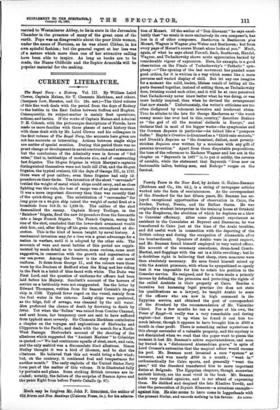tion of Mozart. Of the author of "Don Giovanni" he
says excel- lently that "no music is more exclusively its own composer's, has less in it of other composers. Beethoven is Beethoven plus Mozart, Wagner is Wagner plus Weber and Beethoven; but from every page of Mozart's scores Mozart alone looks at you." Much, again, of what he Bays about Purcell, Bach, Beethoven, Handel, Wagner, and Tschaikowsky shows acute appreciation backed by considerable vigour of expression. Here, for example, is a good observation on the Finale of Tschaikowsky's "Pathetic" sym- phony :—" The opening of the last movement has puzzled some good critics, for it is written in a way which seems like a mere perverse and wasted display of skill. But let any one imagine for a moment the solid, leaden, lifeless result of letting all the parts descend together, instead of setting them, as Tschaikowsky does, twisting round each other, and it will be at once perceived that Tschaikowsky never knew better what he was doing, or was more luckily inspired, than when he devised the arrangement that now stands." Unfortunately, the writer's criticisms are too often disfigured by vehement invective and irrelevant abuse. Thus he alludes to the late Sir George Macfarren as "the worst enemy music has ever had in this country," describes Brahms as"the god of all the musical dullards in Europe," and declares that in most of his bigger works—the symphonies and the German Requiem in particular—he talked like a "pompous duffer." Haydn's Creation is dismissed as a "third-rate oratorio," and Dvorak's Requiem as "the dreariest, dullest, most poverty- stricken Requiem ever written by a musician with any gift of genuine invention." Apart from these disputable propositions, the tone of the references to Madame Wagner and her son in the chapter on "Bayreuth in 1597" is, to put it mildly, the reverse of amiable, while the statement that Bayreuth "lives now on fashionable ladies, betting-men, and Bishops" verges on the farcical.


















































 Previous page
Previous page